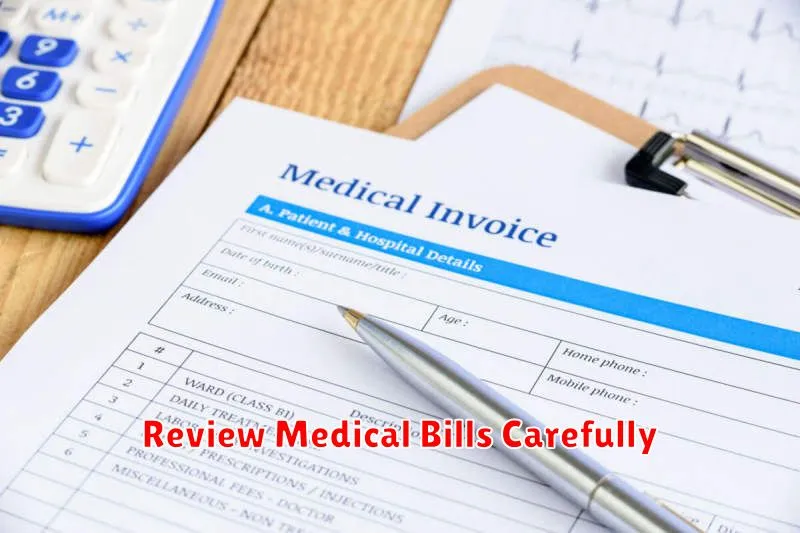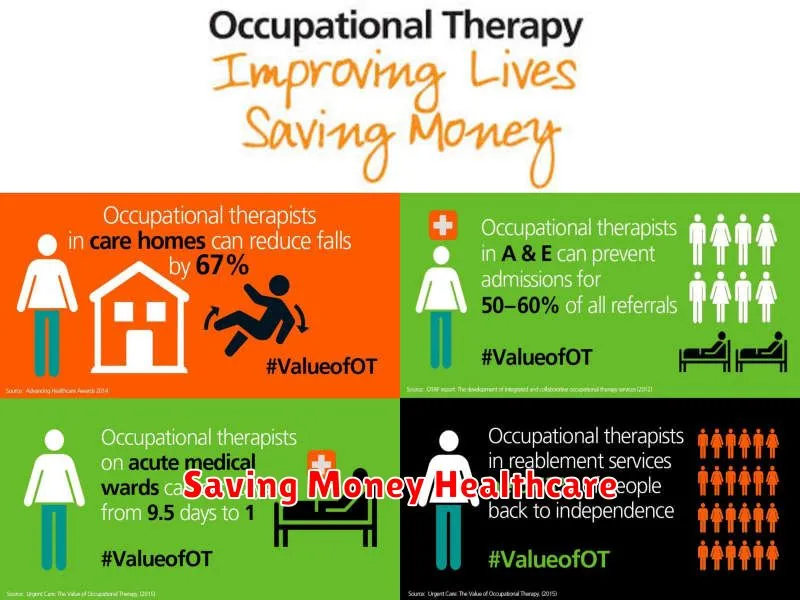Are you looking for ways to save money on healthcare costs? You’re not alone. Healthcare expenses are a major concern for many people, and they can quickly add up. But there are strategies you can use to reduce your out-of-pocket costs and keep your healthcare bills manageable.
From understanding your insurance plan to making smart choices about your healthcare, this article will equip you with the best strategies for saving money on healthcare costs. We’ll delve into practical tips and insights that can help you navigate the complex world of healthcare expenses and make informed decisions about your health and finances.
Understand Your Health Insurance Plan
One of the most crucial steps to saving money on healthcare costs is fully understanding your health insurance plan. This means going beyond just knowing your monthly premium and deductible. Dive into the details, such as:
- Co-pays and Co-insurance: Knowing how much you’ll pay for doctor visits, prescriptions, and hospital stays.
- Network: Understanding which doctors, hospitals, and pharmacies are in your network and which require out-of-network payments.
- Coverage: Familiarize yourself with what your plan covers and what it doesn’t. This includes preventive care, mental health services, and prescription drug coverage.
- Maximum Out-of-Pocket: Understanding the limit on your total healthcare expenses in a given year.
By thoroughly understanding your plan, you can make informed decisions about where to seek care, how to utilize your benefits, and ultimately save money on your healthcare costs.
Shop Around for Medical Services
One of the most effective ways to save money on healthcare is to shop around for medical services. Prices can vary significantly between providers, even for the same procedure or service. This is especially true for elective procedures and services that are not covered by insurance. To find the best deals, consider the following:
- Use online tools: Websites like Healthcare Bluebook and Fair Health can help you compare prices for common medical procedures and services in your area.
- Contact providers directly: Don’t be afraid to call different hospitals, clinics, and doctors’ offices to ask about their prices. Many are willing to negotiate rates, especially if you’re paying out of pocket.
- Check for discounts and promotions: Some providers offer discounts for cash payments, membership programs, or specific services.
By taking the time to shop around, you can potentially save hundreds or even thousands of dollars on your healthcare costs. It’s worth the effort to find the best value for your money.
Utilize Telehealth Services
Telehealth services offer a convenient and cost-effective alternative to traditional in-person medical appointments. By using video conferencing, phone calls, or other digital tools, you can connect with healthcare providers remotely. This eliminates the need for travel, parking fees, and time off work, saving you money in the process.
Telehealth services can be used for a variety of purposes, including:
- Routine check-ups
- Follow-up appointments
- Consultations with specialists
- Mental health therapy
Many insurance plans cover telehealth services, so it’s important to check with your insurer before scheduling an appointment. You can also find affordable telehealth options through various online platforms and apps.
Take Advantage of Preventive Care
Preventive care is the cornerstone of cost-effective healthcare. By investing in regular checkups, screenings, and vaccinations, you can significantly reduce your risk of developing serious health conditions, ultimately saving you money in the long run. Preventive care includes a wide range of services, from annual physicals to screenings for conditions like cancer, heart disease, and diabetes. It is also important to follow up with your doctor about any family history of certain diseases so you can discuss and develop a plan for prevention.
Regular checkups can help identify potential health issues early on, when they are often easier and less expensive to treat. For example, a simple blood pressure check during a routine physical can alert you to hypertension, allowing you to make lifestyle changes or start medication before it causes serious damage to your heart. Immunizations are another vital component of preventive care. Vaccines protect you from contagious diseases, preventing illness and associated medical costs. The cost of a vaccination is far less than the cost of treating a serious illness.
While some preventive services may have a small out-of-pocket cost, the long-term savings from preventing major health problems far outweigh the upfront expense. By prioritizing preventive care, you can improve your overall health and well-being while also protecting your wallet from unnecessary healthcare costs.
Consider a High-Deductible Health Plan (HDHP)
A High-Deductible Health Plan (HDHP) offers lower monthly premiums but higher deductibles. This means you pay less every month but more out of pocket when you need medical care. The trade-off can be beneficial if you’re healthy and don’t anticipate needing frequent medical services.
HDHPs often come with a Health Savings Account (HSA). HSAs allow you to set aside pre-tax money to pay for healthcare expenses. Any money you don’t use rolls over to the next year. This can be a valuable tool for saving money on medical costs.
Consider an HDHP if you:
- Are generally healthy
- Have a predictable income
- Are willing to save money for potential future medical needs
If you’re unsure if an HDHP is right for you, talk to your employer or an insurance broker. They can help you weigh the pros and cons of different plans.
Explore Health Savings Accounts (HSAs)
A Health Savings Account (HSA) is a tax-advantaged savings account that can be used to pay for qualified medical expenses. It’s available to those who have a high-deductible health plan (HDHP). HSAs are a great way to save money on healthcare costs, as the funds you contribute are tax-deductible, grow tax-free, and are withdrawn tax-free when used for qualified medical expenses.
Here’s how HSAs can benefit you:
- Tax Savings: Contributions to your HSA are pre-tax, which means you save money on your taxes.
- Tax-free Growth: The money in your HSA grows tax-free, meaning you can potentially accumulate a larger sum than you would in a traditional savings account.
- Tax-free Withdrawals for Medical Expenses: When you withdraw money from your HSA for qualified medical expenses, it is tax-free. This can save you a significant amount of money over time.
- Carryover Benefits: Unused funds in your HSA roll over year after year, allowing you to accumulate a large balance for future medical expenses.
If you are eligible for an HSA, it’s worth considering opening one. You could significantly reduce your out-of-pocket healthcare costs and save for future medical expenses. However, it is essential to understand the rules and regulations of HSAs before you open one, to ensure you are maximizing its benefits.
Negotiate Medical Bills
You may be surprised to learn that medical bills are often negotiable. Hospitals and doctors’ offices frequently inflate their charges, and they’re often willing to reduce the amount you owe if you ask. Don’t be afraid to ask for a lower price! The worst they can do is say no.
Here are some tips for negotiating medical bills:
- Be polite and respectful. Explain your financial situation and why you need a lower price. A little empathy can go a long way.
- Check your Explanation of Benefits (EOB). This document details what your insurance company covered and what you’re responsible for. Use this information to understand what you’re being billed for.
- Ask about financial assistance programs. Many hospitals and healthcare providers offer financial assistance to patients with limited incomes. Inquire about these programs and see if you qualify.
- Negotiate a payment plan. If you can’t afford to pay the full amount upfront, ask for a payment plan. This will help you manage your debt and avoid late fees.
- Get everything in writing. Once you’ve negotiated a lower price or a payment plan, get it in writing. This will protect you from any future disputes.
Negotiating medical bills can save you a lot of money. By following these tips, you can reduce your healthcare costs and take control of your finances.
Buy Generic Prescription Drugs
One of the easiest and most effective ways to save money on healthcare costs is to opt for generic prescription drugs whenever possible. Generic drugs are chemically identical to their brand-name counterparts but are often available at a significantly lower price. This is because generic drug manufacturers don’t have the same research and development costs as brand-name companies.
To find out if a generic version of your medication is available, talk to your doctor or pharmacist. They can provide you with information about the different options and help you make an informed decision. Many insurance plans also have formularies that list generic medications and may even encourage their use by offering lower copayments or deductibles.
It’s important to note that while generic drugs are just as effective as brand-name drugs, they may look slightly different or have a different taste. However, the active ingredients are the same, ensuring that you’ll receive the same therapeutic benefit. Don’t hesitate to switch to a generic version of your medication if it’s available – it’s a simple way to save a substantial amount of money on your healthcare costs without compromising your health.
Look for Prescription Assistance Programs
Prescription drugs can be incredibly expensive, but there are several assistance programs available to help people afford their medications. One of the best strategies for saving money on healthcare costs is to look for prescription assistance programs. These programs can help you get your medications at a lower cost or even for free.
There are several different types of prescription assistance programs available, including:
- Manufacturer programs: Many pharmaceutical companies offer assistance programs for patients who cannot afford their medications. These programs may offer discounts, copay assistance, or even free medication.
- Patient assistance programs (PAPs): These programs are often run by non-profit organizations and provide assistance to low-income patients who cannot afford their medications.
- Government programs: The government offers several programs that can help you afford your medications, such as Medicare and Medicaid.
To find out if you qualify for a prescription assistance program, you can contact your doctor, pharmacist, or a local health clinic. You can also search online for prescription assistance programs by entering your medication name and your state.
By taking advantage of prescription assistance programs, you can significantly reduce the cost of your medications and save money on healthcare costs.
Maintain a Healthy Lifestyle

One of the most effective ways to save money on healthcare costs is by proactively maintaining a healthy lifestyle. By taking care of your body, you can reduce the risk of developing chronic illnesses that often require costly treatments.
Eating a healthy diet is a fundamental aspect of maintaining good health. Focusing on whole foods like fruits, vegetables, lean protein, and whole grains can provide your body with the necessary nutrients to function optimally. Avoid processed foods, sugary drinks, and excessive saturated fats as they can contribute to various health problems.
Regular physical activity is another crucial component. Aim for at least 30 minutes of moderate-intensity exercise most days of the week. This can include activities like brisk walking, swimming, cycling, or dancing. Exercise helps regulate blood sugar, lowers blood pressure, and strengthens your heart and lungs.
Getting enough sleep is often overlooked, but it plays a vital role in overall well-being. Aim for 7-9 hours of quality sleep each night. Sleep deprivation can weaken your immune system, increase your risk of chronic illnesses, and negatively impact your mental health.
Managing stress is essential for both your physical and mental health. Stress can contribute to various health problems, including high blood pressure, heart disease, and depression. Find healthy ways to manage stress, such as exercise, meditation, spending time in nature, or engaging in hobbies you enjoy.
By incorporating these healthy lifestyle habits into your daily routine, you can significantly reduce your risk of developing health problems that often require expensive treatments. It’s a long-term investment in your health and financial well-being.
Use Discount Programs for Healthcare

Healthcare costs are rising, and many people are looking for ways to save money. One of the best ways to save money on healthcare is to use discount programs. These programs can help you save on everything from prescriptions to doctor’s visits.
There are many different discount programs available, so it’s important to shop around and find the one that’s right for you. Some popular programs include:
- GoodRx: This website and app allow you to compare prices on prescription drugs at different pharmacies and find the best deals.
- Healthcare Bluebook: This website helps you find doctors and hospitals that offer discounted rates for procedures and services.
- Discount medical cards: These cards can provide discounts on a variety of healthcare services, including doctor’s visits, dental care, and vision care.
Before you sign up for a discount program, make sure you read the terms and conditions carefully. Some programs may have restrictions on which providers you can use or which services are covered.
Using discount programs is a great way to save money on healthcare. By taking advantage of these programs, you can keep your healthcare costs under control.
Review Medical Bills Carefully

You may think that healthcare bills are always accurate, but that isn’t always the case. Errors happen, and they can cost you a lot of money. Therefore, it’s important to carefully review each bill to ensure accuracy. This includes checking for incorrect charges, such as billing for services you didn’t receive, wrong billing codes, or mistakes in your insurance coverage information.
Don’t just glance at the total amount. Read through the itemized list, and don’t hesitate to call your insurance company or the healthcare provider if you find any mistakes. By being proactive about reviewing your bills, you can save yourself a lot of money in the long run.
Consider Medical Tourism

Medical tourism is a growing trend, and for good reason. It can offer significant savings on healthcare costs, particularly for procedures that are expensive in the United States. Many countries around the world have high-quality hospitals and medical professionals, but their costs are significantly lower. If you’re considering a major procedure, research medical tourism to see if it’s right for you. You can save thousands of dollars by traveling to a country like India, Mexico, or Thailand for your medical needs.
Be sure to thoroughly research any potential medical tourism provider to ensure they have a good reputation and are licensed and accredited.
Appeal Denied Insurance Claims

Navigating the healthcare system can be a complex and frustrating experience, especially when it comes to insurance claims. It’s common to encounter situations where your claim is denied, leaving you with a hefty medical bill. Don’t despair, as there are strategies for appealing denied insurance claims.
Firstly, understand the reason for the denial. Review the denial letter carefully. Identify the specific reason for the denial, which could include pre-authorization issues, lack of medical necessity, or exceeding coverage limits.
Next, gather supporting documentation. Compile all relevant medical records, doctor’s notes, and any other evidence that strengthens your case. This will help you make a compelling argument for the appeal.
Now, file a formal appeal within the designated timeframe outlined in your insurance policy. This often involves submitting an appeal letter, outlining the reasons why you believe the denial was incorrect, and providing the necessary supporting documentation.
If your initial appeal is denied, consider seeking external assistance. Consult with a patient advocate, healthcare lawyer, or consumer protection agency. These resources can offer guidance, navigate the appeal process, and potentially negotiate with your insurance company on your behalf.
Remember, persistence is key. The appeal process can be lengthy and require patience. However, by understanding the reasons for denial, gathering supporting evidence, and utilizing available resources, you can significantly increase your chances of successfully appealing your insurance claim and achieving a favorable outcome.

